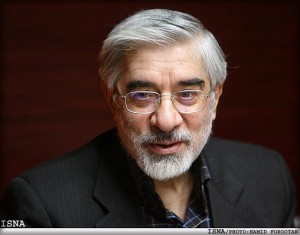Saturday
Feb272010
Iran Analysis: Now It Gets Interesting....
 Saturday, February 27, 2010 at 8:17
Saturday, February 27, 2010 at 8:17 
 URGENT UPDATE 1000 GMT: We've posted extracts from the interview in our latest updates.
URGENT UPDATE 1000 GMT: We've posted extracts from the interview in our latest updates.0830 GMT: The Mousavi interview on Kalemeh has just come out. The takeaway line is "Spreading Awareness is the Goal of the Green Movement", but there is far more here to be read and analysed.
---
Whisper it softly, because the "Western" media are still sleeping, but politics is on the move again in Iran.
Kalemeh, the website of Mir Hossein Mousavi, has put out advance notice this morning that an interview with Mousavi will be coming out later today. No word on content, but this follows last weekend's assurance from a Mousavi-Mehdi Karroubi meeting that they would soon be letting the Iranian people know of their plans and Karroubi's mid-week interviews with his website and with an Italian newspaper.
Meanwhile, in Japan, Ali Larijani is making a big push from within the establishment. The signal of a deal for Japan to carry out "3rd party enrichment" on Iran's uranium is a major international development, but its internal implications are just as significant. If Mahmoud Ahmadinejad, who has been in Syria, is on-board with the Larijani (and probably Larijani-Khamenei) manoeuvre, that points to a coordinated push to move n the nuclear issue and Iran's regional position. However, if the President is out of the loop on the initiative, then Larijani is establishing his credential as the major "secular" player in Iranian politics.
Incredibly, given the attention to the nuclear issue, not many "Western" journalists have noticed the Japan development. Instead, our favourite New York Times reporter, David Sanger, takes the award for If You Don't Know, Just Make Up Some Crazy Stuff. Sanger takes on the question of why Iran moved most of its low-enriched uranium to an above-ground facility two weeks ago (simple answer: Ahmadinejad and Co. wanted a very public demonstration that they could make at least a tiny bit of 20% uranium from 3.5% stock). Since he has no information other than Washington chit-chat (whether it is based on actual intelligence, rumour, or propaganda), this is where the piece winds up:
The strangest of the speculations — but the one that is being talked about most — is that the Iranian Revolutionary Guard Corps is inviting an attack to unify the country after eight months of street demonstrations that have pitted millions of Iranians against their government.
A somewhat most significant story, albeit based on more over-statement comes from the address of Ehud Barak, the Israeli Defense Minister, to the Wasihngton Institute for Near East Policy:
Israeli Defense Minister Ehud Barak raised doubts Friday on the likelihood of an Iranian nuclear strike on his country.
I don't think the Iranians, even if they got the bomb, (will) drop it in the neighborhood. They fully understand what might follow. They are radical but not totally crazy.
Barak's signal came after meetings with US officials like Secretary of State Hillary Clinton. In contrast to Sanger, the Israeli minister --- and the State Department --- are taking the rationale for an Israeli military attack on Iran off the table. The push will be for stricter economic sanctions.
Not that those sanctions are assured of an easy passage. Russia's Foreign Minister Sergei Lavrov put out his own signal, eagerly received by Iran's state media:
There is no evidence that Iran has made a decision to produce nuclear weapons. If we go with the sanctions, we'll not go beyond the goal of our purpose of defending the nonproliferation regime.
We don't want the nonproliferation regime to be used for ... strangling Iran, or taking some steps to deteriorate the situation [and] the living standards of people in Iran.
That's not a total rejection of more sanctions but a carefully-worded statement that any new steps will have to be measured and only pursued after much discussion.
Which brings us back to the really interesting news. While the international show goes on, it is the Iranians themselves --- be it a Mousavi or a Larijani --- who deserve watching right now.




